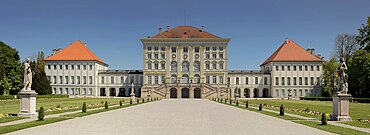Monks, girls and pandours
| Movie | |
|---|---|
| Original title | Monks, girls and pandours |
| Country of production | Germany |
| original language | German |
| Publishing year | 1952 |
| length | 85 minutes |
| Age rating | FSK 12 |
| Rod | |
| Director | Ferdinand Dörfler |
| script | Hans Fitz |
| production | Ferdinand Dörfler |
| music | Emil Ferstl |
| camera | Georg Krause |
| cut | Walter Boos |
| occupation | |
| |
Mönche, Mädchen und Panduren is a German feature film from 1952 by Ferdinand Dörfler with Joe Stöckel in the leading role of a brother brewing beer.
action
Bavaria, around 1750. The country is ravaged by plundering troops of horsemen from the Hungarian lowlands, the Pandours. Bavaria's elector expressly orders that his police must not take action against the Pandours. The people are fermenting, they want to take action against the intruders. Munich's Paulaner monastery is heavily in debt, and the monks also suffer from the unrest-related food shortage. In order to fight hunger during Lent, the monastery board, the prior, and the monastery master brewer, Brother Barnabas, come up with the idea of brewing a strong beer. It is the hour of birth of Paulaner beer.
But there is also another problem: Megerle, secret secretary of the Elector of Bavaria, would like to marry the young Gustl, who as a ward is under the protection of the goldsmith Fellerer. But the girl does not want to marry the old man because her heart belongs to the handsome lay brother Johannes from the Munich Paulaner monks. His vow demands that as long as he spends his (limited) time in the monastery, he has to keep his hands off the opposite sex. The fat, cozy Barnabas has mercy on the young lovers and puts Gustl in a monk's robe at the moment when wild horse hordes of the Pandours storm and occupy the monastery complex and all of Munich.
The farmer's cunning Barnabas then makes the intruders drunk with his delicious barley juice and puts them temporarily out of action. In between, Secretary Megerle, angry that Gustl steadfastly refuses, has the girl and her lover Johannes arrested and locked up. Barnabas intervenes again and penetrates as far as the Elector of Bavaria. There it turns out that the scheming, treacherous Megerle is secretly making common cause with the Pandours. Megerle experiences the punishing hand of his noble employer, and lay brother Johannes is appointed the elector's body hunter. Now he can finally marry his Gustl.
Production notes
Mönche, Mädchen und Panduren was made in 1951 in the Munich-Geiselgasteig film studio and in Munich (Nymphenburg Palace) and the surrounding area (exterior shots). The premiere took place on October 2, 1952 in the Munich City Hall Lichtspiele.
Franz Wagner was the production manager. Ludwig Reiber designed the film structures, Georg Heiler the costumes. Walter Rühland was concerned about the tone.
Reviews
Der Spiegel wrote: “Long overdue Bavarian film memorial for the blissful of white-blue humanity, the Paulaner brewing monk Barnabas, who, to alleviate his torments of fasting and for the benefit of many generations of beer drinkers, brought up the nourishing Salvator beer. Pandours take castor baths in his brewing vats, an honorable maid (Petra Peters) inflames for a lay brother and takes refuge in a monk's robe, but the great work succeeds. For Joe Stöckl the role of his life, for the Munich a post-Oktoberfest fun. "
In the lexicon of the international film it says: “Bavarian folk piece about the beer-brewing Paulaner from the time of the Wittelsbacher, who have to defend themselves against the arrogance of roaming Pandur hordes. Relatively well done in terms of local and time color. "
Individual evidence
- ↑ Short review in Der Spiegel from October 15, 1952
- ^ Monks, girls and pandours. In: Lexicon of International Films . Film service , accessed June 1, 2020 .
Web links
- Monks, girls and pandurs on doerfler-film.de
- Monks, girls and pandours in the Internet Movie Database (English)
- Monks, girls and pandurs at filmportal.de
